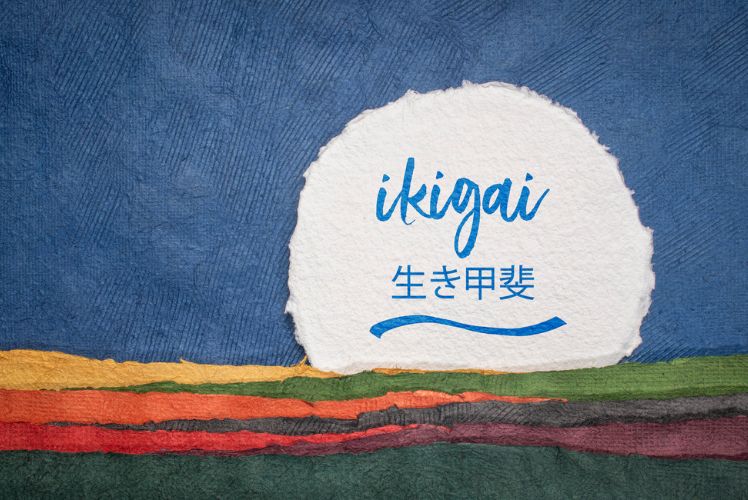Ikigai is a Japanese concept that translates to "a reason for being." It combines our passions, talents, and the needs of the world to help us find meaning in life. Ultimately, Ikigai serves as a guiding principle that leads to a fulfilling life, impacting our health, happiness, and relationships. By exploring the elements that contribute to our personal Ikigai, we can gain insights into how to enrich our daily lives.

Understanding Ikigai involves recognising its various dimensions, from our individual pursuits to the broader community connections. This journey not only encourages self-discovery but also promotes wellbeing and longevity. As we learn how to apply Ikigai in modern work and personal relationships, we begin to see its global relevance, transcending cultures and inspiring many around the world.
As we dive deeper into this topic, we will answer common questions and break down the elements that define Ikigai. By the end, we will see how this profound concept can lead us towards a richer and more meaningful existence.
Key Takeaways
- Ikigai helps us find purpose by aligning our passions, skills, and societal needs.
- Embracing Ikigai can improve our health and strengthen our community ties.
- The concept of Ikigai is relevant in today’s work-life balance and personal fulfilment.
The Essence of Ikigai

Ikigai is a rich Japanese concept that represents our "reason for being." It combines elements of passion, mission, vocation, and profession. Understanding its historical roots and cultural significance helps us appreciate why it holds such importance in our lives.
Historical Context
The term "ikigai" has roots in Okinawa, Japan, where longevity and happiness are prominent. Mieko Kamiya, a Japanese philosopher, was among the first to articulate this concept in the 1960s. She described ikigai as a feeling of fulfilment derived from living with purpose.
Historically, ikigai was connected to lifestyle choices and community values. People believed that having a sense of purpose contributes to both mental and physical well-being. The idea encourages us to find balance in our lives, focusing on what brings us joy and fulfilment.
Ikigai and Its Place in Japanese Culture
In Japanese culture, ikigai is deeply ingrained in daily life. It inspires individuals to pursue their passions while contributing to society. The concept is often depicted as a Venn diagram, where love, skill, societal contribution, and what we can get paid for converge.
This intersection signifies the essence of life satisfaction. Japanese people often view work as a form of personal growth. By identifying our ikigai, we can enhance our well-being and lead more meaningful lives. The concept serves as a reminder that our purpose is not just a personal matter; it extends to the communities we live in and the world we inhabit.
Understanding the Ikigai Diagram

The Ikigai Diagram is a helpful tool that shows how various aspects of our lives can come together to create a fulfilling life. It consists of four main components and highlights the importance of finding intersections between these areas.
Components of Ikigai
The Ikigai Diagram is made up of four key components:
-
What We Love: This refers to our passions and interests. It includes activities that bring us joy and excitement.
-
What We Are Good At: This involves our skills and talents. Recognising what we excel in can guide us towards fulfilling careers and hobbies.
-
What The World Needs: This aspect relates to societal needs and challenges. Identifying areas where we can contribute can lead to a meaningful sense of purpose.
-
What We Can Be Paid For: This component focuses on professions and vocational paths. It helps us explore ways to turn our passions and skills into a viable career.
Intersections and Meaning
The magic of the Ikigai Diagram lies in where these components overlap.
-
Vocation: This is the intersection of what we are good at and what the world needs. It can guide us toward meaningful work that benefits society.
-
Passion: The area where what we love meets what we are good at. Pursuing our passions enriches our lives and keeps us motivated.
-
Mission: This intersection combines what we love and what the world needs. It provides direction and highlights how we can impact others positively.
-
Profession: This area overlaps what we can be paid for and what we are good at. Finding our profession here often leads to fulfilling careers.
By understanding these components and their intersections, we can work towards finding our own Ikigai, leading to a more balanced and satisfying life.
Health and Longevity

Understanding how ikigai relates to health and longevity can guide us toward better lifestyles. This philosophy encourages us to seek purpose, which can lead to healthier choices and a longer life.
Ikigai and Healthy Life Choices
Ikigai emphasises the importance of finding meaning in our daily activities. When we engage in pursuits aligned with our passions, we tend to make healthier choices.
For instance, pursuing a hobby often leads to increased physical activity. This, in turn, can improve fitness and enhance our emotional well-being.
Key healthy habits linked to ikigai include:
- Balanced Diet: Choosing nutrient-rich foods supports our physical health.
- Social Connections: Building strong relationships can boost mental health.
- Mindfulness: Practicing mindfulness aids in stress reduction and promotes better mental clarity.
By focusing on what brings us joy, we naturally gravitate toward healthier routines and lifestyle choices.
Okinawa: A Case Study in Longevity
Okinawa, known for its high number of centenarians, serves as a prime example of ikigai's impact on longevity. The island is one of the famed Blue Zones, areas where people live significantly longer than average.
Several factors contribute to the health of Okinawans:
- Diet: Their diet is rich in vegetables, fish, and whole grains, which supports longevity.
- Active Lifestyle: Many Okinawans remain physically active throughout their lives, engaging in daily exercise.
- Community Engagement: Strong social ties provide emotional support and a sense of belonging, essential for mental health.
The combination of these elements highlights how ikigai can lead us to healthier choices and longer lives.
Ikigai in Daily Life

Incorporating ikigai into our daily lives can help us find greater meaning and satisfaction. We can achieve this by focusing on our passions, connections with others, and the activities that bring us joy.
Practical Tips for Finding Your Ikigai
To discover our ikigai, we can start by asking four key questions:
- What do we love? Identify activities that bring us joy.
- What are we good at? Recognise our skills and talents.
- What can we be paid for? Consider opportunities that align with our passions and skills.
- What does the world need? Think about how we can contribute to our community.
By reflecting on these questions, we gain clarity about our interests and values. Keeping a journal can be helpful. We can note our thoughts and feelings about different activities. This process allows us to pinpoint what truly matters to us.
Staying Motivated and Engaged
Staying motivated is essential for embracing ikigai. We can achieve this by:
- Building Relationships: Connect with others who share our passions. This creates a supportive environment that encourages growth.
- Participating in Community Activities: Engaging in local projects can help us feel part of something bigger. It also connects our skills with what our community needs.
- Pursuing Hobbies: Dedicate time to activities we love. Whether it's painting, gardening, or playing music, hobbies can nourish our souls.
By focusing on these aspects, we maintain our enthusiasm. This not only enriches our lives but also nurtures a sense of purpose that keeps us engaged every day.
Community and Relationships
Connecting with others plays a crucial role in finding our ikigai. Building strong relationships and being part of a supportive community can greatly influence our sense of purpose. Let's explore how social connections and communities contribute to this fulfilling journey.
Ikigai and Social Connections
Our relationships significantly impact our happiness and well-being. Meaningful social connections provide emotional support and encouragement, helping us navigate life's challenges. We thrive when we share experiences, thoughts, and feelings with others.
Developing these connections can lead to a more profound understanding of our passions and strengths. By discussing our goals and aspirations with trusted friends, we can gain valuable insights that help clarify our purpose. These interactions deepen our sense of belonging and foster a supportive environment.
The Role of Community
Communities act as pillars of support in our search for ikigai. They provide us with a network to lean on during tough times. A strong community cultivates relationships built on trust and shared values, which are essential for personal growth.
Moreover, being part of a community that aligns with our passions can boost our motivation. Engaging with like-minded individuals helps us stay focused and inspired. We can draw strength from collective efforts, which enhances our ability to give back and contribute meaningfully.
The Global Reach of Ikigai
Ikigai has transcended its origins in Japan and now influences many cultures and communities worldwide. This section explores how the concept has gained traction beyond Japan and how it compares to other cultural approaches to fulfilment.
Ikigai's Influence Beyond Japan
We see the concept of ikigai embraced in various parts of the world. Dan Buettner, in his work on Blue Zones, highlights areas like Sardinia, where residents live long, fulfilling lives. The principles of ikigai align closely with the lifestyles of these communities, focusing on purpose, relationships, and well-being.
In the United States, especially in California, we find similar themes being discussed. People are seeking meaningful work and personal satisfaction. Workshops and books on ikigai are gaining popularity, encouraging individuals to reflect on their passions and skills.
The concept of ikigai has also been shared through platforms like TED Talks, where speakers discuss its relevance in modern life. This growing interest shows how ikigai resonates with our universal search for meaning and happiness.
Comparison with Other Cultures' Concepts of Fulfilment
Various cultures have their unique paths to fulfilment that bear similarities to ikigai. For instance, in Costa Rica, the idea of “pura vida” embodies a joyful, purposeful life. This phrase reflects an attitude of appreciation for life, much like the Japanese concept.
In Western cultures, ideas around purpose and fulfilment often revolve around self-actualisation and personal happiness. Concepts like mindfulness and work-life balance echo the principles of ikigai, emphasising the balance between what we love and what the world needs.
Exploring these similarities helps us understand that while the expressions may differ, the core idea of finding purpose connects us across cultures. In doing so, we can create a broader understanding of how to live fulfilling lives globally.
Ikigai in Modern Work and Career
In today’s world, understanding how our passions align with our professions is crucial. We explore how Ikigai can guide us in shaping our careers and driving innovation within our workplaces.
Aligning Your Career with Your Ikigai
Finding our Ikigai involves identifying our worth, vocation, passion, and profession. This process helps us align our career choices with what truly matters to us.
We can start by listing key elements:
- What we love: This includes our passions and interests.
- What we are good at: Reflect on our skills and strengths.
- What the world needs: Consider societal demands and challenges.
- What we can be paid for: Identify viable professions that offer financial stability.
When we align these aspects, we can create a fulfilling career path. Engaging in work that resonates with our Ikigai can increase motivation and satisfaction. This means our jobs are not just a means to earn money but also a way to contribute positively to society.
Ikigai as a Driver of Innovation and Purpose
Ikigai encourages us to think beyond personal success. It fosters a culture of innovation and purpose within teams. When we understand our true motivations, we can inspire others to do the same.
Companies that embrace this philosophy often see heightened creativity. This stems from employees feeling valued and connected to their work. Together, we can push boundaries and explore new ideas.
Organisations can support this by creating environments where employees share their passions. Workshops, team-building activities, and open discussions promote a spirit of collaboration.
By nurturing our Ikigai, we create workplaces that are not only productive but also enriching. We foster a sense of community, where each member contributes meaningfully. This holistic approach can lead to growth for both individuals and the organisation as a whole.
The Spiritual and Philosophical Dimensions of Ikigai
Ikigai offers a way to explore our meaning of life and define what truly matters to us. It encourages us to discover our purpose through our passions and talents. This pursuit can lead to a deeper understanding of ourselves and our place in the world.
In our journey, we often find courage to face challenges. By identifying what gives our lives meaning, we are empowered to take risks. Embracing our ikigai provides strength during difficult times and fosters resilience.
The concept is not just about personal fulfilment; it also has a healing aspect. Engaging in activities aligned with our ikigai promotes mental well-being. It helps us cope with stress and enhances our overall life satisfaction.
Francesc Miralles, in his writings on ikigai, emphasises the importance of balance. He suggests that true happiness comes from harmonising our passions with the needs of the world. This balanced approach can lead us to fulfil our potential and contribute positively to others.
By exploring these spiritual and philosophical dimensions, we can unlock a richer, more meaningful life. Ikigai encourages a holistic view, where our sense of purpose intertwines with our daily actions. This journey is one of personal discovery and connection with the larger world around us.
Frequently Asked Questions
In this section, we address common queries about Ikigai. We cover its pronunciation, the test involved, practical examples, its cultural significance, inspiring quotes, and the meaning of 'vocation' within this context.
How is Ikigai correctly pronounced?
Ikigai is pronounced as "ee-kee-guy". The emphasis is on the final syllable, "guy". Knowing the correct pronunciation helps us engage more authentically with this concept.
What does the Ikigai test involve?
The Ikigai test typically involves a series of questions that explore what we love, what we are good at, what the world needs, and what we can be rewarded for. This self-reflective exercise helps us find our personal intersection of passion, mission, vocation, and profession.
Could you provide some examples of Ikigai in practice?
Examples of Ikigai may include someone who loves cooking and is skilled at it, while also fulfilling a community need for healthy meals. Another example could be an artist who makes a living selling their work and brings joy to others through their creativity.
How is the concept of Ikigai understood and used in Japanese culture?
In Japan, Ikigai is often seen as a guiding principle that encourages individuals to pursue their passions alongside societal contributions. It is not merely about personal happiness, but also about finding a purpose that positively impacts others.
What are some inspiring quotes related to Ikigai?
Some notable quotes about Ikigai include, “Your Ikigai is where your happiness and contribution converge” and “The secret to a long life is having something to live for.” These quotes remind us of the importance of purpose and fulfilment.
What does the term 'vocation' signify in the context of Ikigai?
In Ikigai, 'vocation' refers to a calling that aligns our passions with our skills and the needs of the world. It implies not just a job, but a deeper sense of purpose that brings satisfaction and meaning to our work.





















